Sustainability on campus
Sustainability is structurally embedded in our operations. We want to be pioneering, to take responsibility and to set an example on campus. We therefore want to limit our impact on the environment as much as possible, and to contribute actively to solutions. Sustainability is not an isolated ambition then, but runs through our whole strategy, and through all our education and research.
Sustainable Development Goals (SDG) of Tilburg University:
- SDG 3: Good health and well-being
- SDG 5: Gender equality
- SDG 7: Affordable and clean energy
- SDG 9: Industry, Innovation and Infrastructure
- SDG 10: Reduced inequalities
- SDG 11: Sustainable cities and communities
- SDG 12: Responsible consumption and production
- SDG 15: Life on land
- SDG 16: Peace, justice and strong institutions
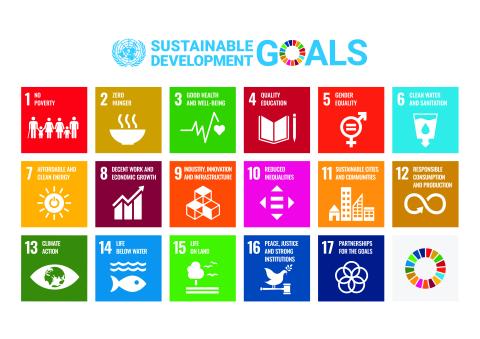
SDG 3: Good health and well-being
A healthy campus
Wherever possible, Tilburg University buildings make a positive contribution to the health and well-being of students, employees and campus visitors. We create a comfortable indoor climate by ensuring that there is enough light and air, minimizing noise and disturbances, and ensuring pleasant acoustics. We also use construction products and materials that are free of toxic substances. Our buildings are stimulating environments where students, employees and campus visitors can have new experiences and learn new skills. We provide a wide range of healthy food and good sports facilities, to challenge students, employees and visitors alike to make healthy choices.
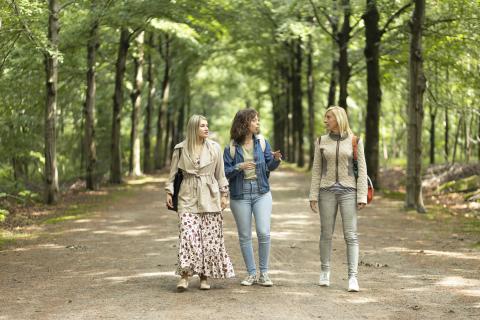
SDG5: Gender equality
Gender & Diversity
An open and inclusive culture is important to us at Tilburg University. In our new Strategic Plan for 2022-2027, we build on and expand our policy in the field of diversity and inclusion. Our students and staff include people from many diverse backgrounds, and from different countries inside and outside Europe. We embrace all these different nationalities and the different perspectives that each one brings. There is space for everybody on our campus, regardless of their gender, ethnicity, color, sexual orientation, age, religious or philosophical beliefs or disability.
SDG 7: Affordable and clean energy
Energy
We are working towards making all the energy we use for buildings and grounds carbon neutral. The oldest part of Tilburg University's campus, the Warande location, dates from (well) before 2000. In recent years, more attention has been paid to sustainability during renovations and alterations. For example, we have improved the energy labels of buildings and installed solar panels where possible. Building Cube (energy label A) was specifically designed and built with extra attention to sustainability; for example, the building has a BREEAM Excellent certificate. The education building under construction, the Marga Klompé education (energy label A+++++) has the BREEAM Outstanding design certificate and meets the BENG requirements (Nearly Energy Neutral Buildings). At times of renovation, improving energy performance is key, through additional insulation, low-temperature heating and high-temperature cooling. Climate adaptation is an integral part of demolition, new construction, renovation and maintenance. Climate adaptive measures include less petrification and a greener campus. The impact of such adaptations is to, for example, be able to better regulate heat stress. Reduced heat impact on campus means that buildings need to be cooled less, and a climate adaptive campus thus reduces energy consumption.
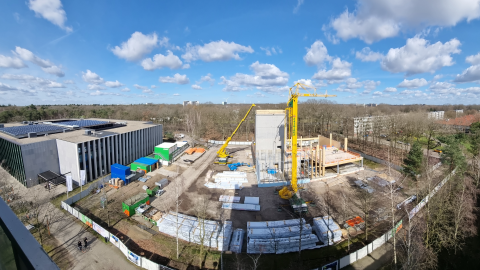
SDG 9: Industry, Innovation and Infrastructure
Mobility
Tilburg University believes it is essential to reduce its carbon footprint created by mobility. Research shows that the majority of our carbon footprint comes from the journeys made by our employees and students to campus. We are aiming to reduce these emissions by 75 percent by 2030. We are improving bicycle facilities and encouraging staff and students to come to the campus by bicycle, e-bike or speed bike. We also want to reduce the carbon footprint of our business trips to zero by 2027. We already offer employees various options to attend meetings or take part in conferences and symposia online wherever possible, whether at home or abroad. And in cases where they need to be physically present, we encourage the use of a sustainable means of transport, such as travelling by bicycle and public transport.
SDG 10: Reduced inequalities
Community involvement and development
Tilburg University gives people who have been outside the labor market the opportunity to gain work experience and to take part. Since 2010, approximately 60 people have been given the opportunity to gain six months’ work experience.
Disabled students
Do you have dyslexia or are you easily distracted because you have AD(H)D? Do you find it difficult to work with other students because you have an ASD? Do you have a chronic illness that means you have less energy some or all of the time? Or does your physical disability mean that you cannot always make it to the lecture hall on time? There are many other (chronic) illnesses and conditions that can be an impediment to studying. At Tilburg University, we are happy to look with you at what you need to be able to study optimally.
SDG 11: Sustainable cities and communities
Sustainable housing policy
Tilburg University has a green campus and we take great pride in that. Our location, next to the Oude Warande forest and recreation area, with numerous trees and plants on the oldest section of the campus, makes us unique in the Netherlands. Any time we make changes to the layout of the campus, we aim to maintain its green character. Sustainability is also central to our current design plans.
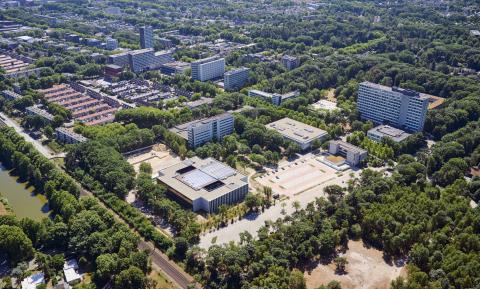
Increasing spatial efficiency
Our goal is to utilize existing real estate in a smarter and more efficient way, with the possible positive effect of being able to dispose of certain buildings.
SDG12: Responsible consumption and production
Waste
We do not have waste bins for separating different types of waste on the Tilburg University campus. But we do process our waste in a sustainable manner. You can read more about how we do that here:
Sustainability and circularity
Circularity is an important part of sustainability. We strive for circular construction, demolition and renovation on our Tilburg University campus. This means that we consider the entire life cycle of a product. We reuse existing products as much as possible and use raw materials and products in a conscious way so that they can be reused in a high-quality manner.
Nutrition
At Tilburg University we are fully committed to healthy, sustainable, vegetarian and animal-friendly products. We would like our employees, students and campus visitors to make healthy choices. That means less salt, fat, sugar and meat and as little waste as possible. We hold tasting events and live cooking events in the Restaurant. Together with local small businesses, we provide an innovative, healthy range of food and drinks. Coffee is roasted using a circular process in the CIRfood outlets.
Sustainability in tenders
We aim to make an active contribution to limiting adverse consequences for people and the environment. We focus on this in our management and purchase of business assets and whenever we select partners such as suppliers.
SDG 15: Life on land
Boosting biodiversity
We take ecological principles into account in our construction activities, landscape design and the implementation of other projects, and we contribute actively to strengthening biodiversity.
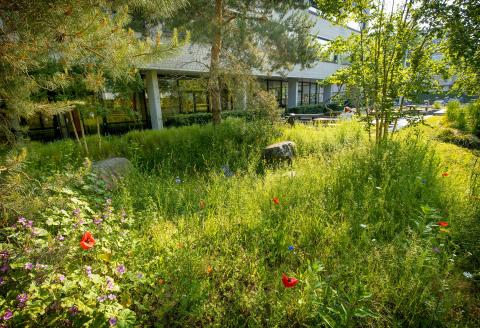
SDG 16 Peace, justice and strong institutions
Conduct and integrity
Tilburg University has a number of rules and values that guide working and studying at Tilburg University. Our Code of Conduct makes the values and standards at our university explicit and describes the requirements regarding personal conduct of employees and students. The Privacy & Security Portal gives you a complete overview of everything you need to know when working with personal data or other data that you need to store securely. Specific rules of conduct are laid down in separate regulations, which are referred to below. These regulations contain complaint procedures and provide possibilities to impose sanctions.
